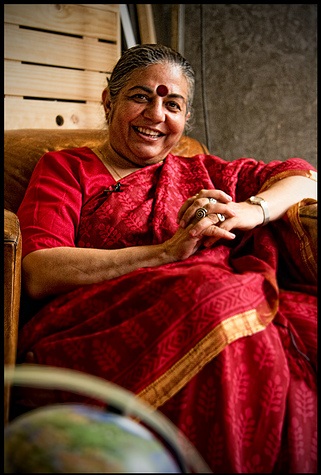
A soil pilgrimage
"Organic farming is the answer to drought and climate change. If we do not respect the soil and if we do not recommit ourselves to ahimsa, we can rapidly disintegrate as a civilisation."
I have just returned from a soil pilgrimage undertaken to celebrate the International Year of Soil and renew our commitment to a non-violent relationship with the earth, the soil and our society. On October 2, we started the pilgrimage from Bapu Kutir at Sevagram Ashram, Maharashtra. My fellow pilgrims were those who have contributed over half-a-century of their lives to build the organic movement — Andre Leu, president of International Federation of Organic Agricultural Movements (IFOAM), Ronnie Cummins, director of the Organic Consumers Association (OCA) of the United States, and Will Allen, a professor and long-time organic farmer.
October 8, 2015 | Source: The Asian Age | by Vandana Shiva
“Organic farming is the answer to drought and climate change. If we do not respect the soil and if we do not recommit ourselves to ahimsa, we can rapidly disintegrate as a civilisation.”
I have just returned from a soil pilgrimage undertaken to celebrate the International Year of Soil and renew our commitment to a non-violent relationship with the earth, the soil and our society. On October 2, we started the pilgrimage from Bapu Kutir at Sevagram Ashram, Maharashtra. My fellow pilgrims were those who have contributed over half-a-century of their lives to build the organic movement — Andre Leu, president of International Federation of Organic Agricultural Movements (IFOAM), Ronnie Cummins, director of the Organic Consumers Association (OCA) of the United States, and Will Allen, a professor and long-time organic farmer.
At Mahatma Gandhi’s hut, we took a pledge to stop the violence to the soil through chemical fertilisers and poisons and promote organic farming as ahimsa kheti. We dedicated ourselves to a transition from a violent, chemical, industrial agriculture that is destroying soil fertility and trapping farmers in debt through high-cost seeds and chemicals.
Vidarbha, for example, has emerged as the epicentre of debt-induced farmers’ suicides. It is also the region with the highest acreage of genetically modified organism (GMO) Bt cotton. Fields of non-Bt, native cotton — which is totally pest and weed-free — gives more yields than Bt cotton.
The Bt fields are being doused in pesticides because of pest outbreaks, since Bt is failing as a tool to control pests. Bt cotton fields are also being sprayed with Monsanto’s Roundup, a known carcinogen to control weeds.
There is no regulation of the poisons being used. Most of the GMO cotton seed is being blended and labelled for sale as vegetable oil. We are being fed GMO cotton seed oil, even though GMOs are not allowed in food in India. And while toxic oils spread without regulation, the new food safety rules have shut down the ghani (virgin oil press) that sold healthy and safe oils like flax, groundnut, sesame and mustard.
The oilcake is being fed to our cows. Those who kill others in the name of cow protection are silent on the fight against the toxic giants who are poisoning our “gau mata”.
The pilgrimage concluded at the Agriculture College, Indore, which started as Albert Howard’s institute on organic farming that contributed to the famous Indore process of composting.
Mahatma Gandhi came to know of the Indore process when he visited London to attend the Round Table Conference. Gandhi and Howard have shown that we can have a peaceful and respectful relationship with the soil and with each other.
Howard was sent to India in 1905 by the British Empire to introduce chemical farming. When he arrived, he found the soils were fertile and there were no pests in the fields. He decided to make the Indian peasant his professor and wrote the book An Agricultural Testament, known as the bible of organic farming.
Organic farming is the original example of “Make in India”. Howard’s book helped spread the organic movement to the US through the Rodale Institute and to the UK through the Soil Association, finding its way to far corners of the world.
The soil pilgrimage was our expression of gratitude to sources of organic farming in India — our fertile and generous land and Mother Earth that have sustained us for millennia.
Ecological and regenerative agriculture is based on recycling organic matter, and hence recycling nutrients. It is based on the Law of Return — giving nutrients back to the soil. As Howard wrote in The Soil and Health: “Taking without giving is a robbery of the soil and a banditry; a particularly mean form of banditry, because it involves the robbing of future generations which are not here to defend themselves.”
